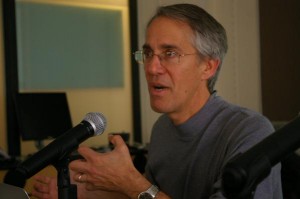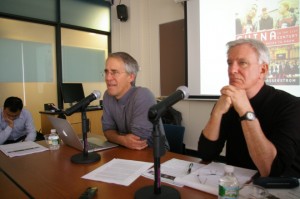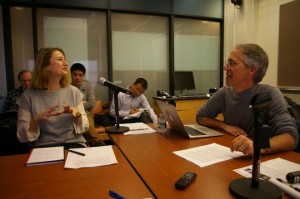
On February 4th Jeffrey Wasserstrom gave a highly attended and very engaging talk on the longevity of the Chinese communist regime. The (anti)-lessons the leaders of the Communist party took from the fall similar organizations in Eastern Europe and the subsequent breakdown of the Soviet Union were two: cut any organized opposition to the regime at the root and allow personal choice in some realms like consumption and lifestyle. These two lessons gave shape to the new Chinese Dream and at the same time fuel the modern Chinese Nightmare. Prof. Wasserstrom used a series of illustrations and photographs to guide his audience through these two polarities of modern Chinese life.
The new Chinese Dream took shape over the next couple of decades, the dream of modern, globalized China in touch with its past: the China of super-fast trains and Confucian values. Today, one can find not only global luxury brands and high-rises but also, somewhat paradoxically, a bookstore entirely dedicated to George Orwell and “1984”. Throughout the 1990s and on, the control over intellectual consumer goods was loosened and one could find a wider range of things to read or listed to, such as Hannah Arendt’s “The Origins of Totalitarianism” or Aldus Huxley’s “Brave New World”. More freedom to discuss things in private, less pressure to conform at universities: “If it is not a movement, anything goes!”, is the way a Chinese bartender put it.
On the other hand, intellectuals and students cannot organize and public criticism of the regime is not tolerated. The Chinese Nightmare of modernity carried too far is realized in the image of skyscraper with a huge screen on it, all mired in thick smog. Both “1984” and “Brave New World” capture the new Chinese Nightmare – Big Brother Watching but also keeping people in line by encouraging decadence and stroking fears. Soft and hard forms of authoritarianism co-exist and the Chinese Communist Party has learned how to use coercion, censorship, cooptation, or conciliation at different times and places.
Unfortunately, the last few years seem to point to a new tightening of the regime, as some pressure is exerted again against artistic and intellectual freedom. Global events, such the recession of 2008, the bloody protests in Egypt and elsewhere in the Middle East, and even terrorism is used by the party to bolster its claim that it is keeping chaos at bay. Wasserstrom told of an old joke which used to have resonance in China and Eastern Europe in the 1980s:
An American goes to China and boasts to the Chinese of the freedoms Americans have:
– I can go to Times Square and shout ‘Ronald Reagan is an idiot’ and nothing will happen to me.
To which his Chinese host replies:
– You are so boastful, we have the same freedoms in China. I can go to Tienanmen Square and shout ‘Ronald Reagan is an idiot’ and nothing will happen to me either.
This joke still resonates in China.


